In my Realtime Database (Firebase) i have two 'collections' one for essen(food) and one for bewertung (rating of the foods)
I try to display the data for each food in my app, which works for the name of the food an the price (Preis)
therefore i calculate the average rating for each food, which works according to the values which are displayed in the console
but when i try to access the average of each food, to set it to an TextView the average is 0.0, which is the default float-value. But every other value of a food is displayed correctly (name and price)
Here is my fragment java class where i calculate the average and set all values i retrieve from firebase:
public class Aktuelle_Bewertungen_Fragment extends Fragment{
//Elemente:
private RecyclerView recyclerView_aktuelle_Bewertungen;
private View aktuelleBewertungenView;
private DatabaseReference essenRef;
private DatabaseReference bewertungenRef;
@Nullable
@Override
public View onCreateView(@NonNull LayoutInflater inflater, @Nullable ViewGroup container, @Nullable Bundle savedInstanceState) {
aktuelleBewertungenView = inflater.inflate(R.layout.fragment_aktuelle_bewertungen, container, false);
//Elemente finden:
recyclerView_aktuelle_Bewertungen = (RecyclerView) aktuelleBewertungenView.findViewById(R.id.recyler_aktuelle_bewertungen);
//Referenz auf essen:
essenRef = FirebaseDatabase.getInstance().getReference().child("essen");
//Referenz auf bewertungen:
bewertungenRef = FirebaseDatabase.getInstance().getReference().child("bewertung");
return aktuelleBewertungenView;
}
@Override
public void onStart() {
super.onStart();
FirebaseRecyclerOptions options = new FirebaseRecyclerOptions.Builder<essen>().setQuery(essenRef, essen.class).build();
final FirebaseRecyclerAdapter<essen, EssenViewHolder> adapter = new FirebaseRecyclerAdapter<essen, EssenViewHolder>(options) {
@NonNull
@Override
public EssenViewHolder onCreateViewHolder(@NonNull ViewGroup parent, int viewType) {
View view = LayoutInflater.from(parent.getContext()).inflate(R.layout.reihen, parent, false);
EssenViewHolder viewHolder = new EssenViewHolder(view);
return viewHolder;
}
@Override
protected void onBindViewHolder(@NonNull final EssenViewHolder holder, final int position, @NonNull essen model) {
final ArrayList<essen> testessen =new ArrayList<>();
essenRef.addValueEventListener(new ValueEventListener() {
@Override
public void onDataChange(@NonNull DataSnapshot dataSnapshot) {
for (DataSnapshot ds : dataSnapshot.getChildren()){
final essen e = new essen();
e.name = ds.child("name").getValue(String.class);
e.Preis = ds.child("Preis").getValue(String.class);
bewertungenRef.addValueEventListener(new ValueEventListener() {
@Override
public void onDataChange(@NonNull DataSnapshot dataSnapshot) {
float sum = (float) 0.0;
int counter = 0;
for (DataSnapshot ds1 : dataSnapshot.getChildren()){
if (ds1.child("eid").getValue(String.class).equals(e.name)){
sum = sum + ds1.child("wert").getValue(float.class);
counter ++;
}
}
float durchschnitt = sum/counter;
Log.i("durchschnitt" , " " + sum + " "+ counter + " " +durchschnitt);
e.setAverage(durchschnitt);
Log.i("essen wert: " , " " + e.getAverage());
}
@Override
public void onCancelled(@NonNull DatabaseError databaseError) {
}
});
testessen.add(e);
}
holder.essenName.setText(testessen.get(position).getName());
holder.essenPreis.setText(testessen.get(position).getPreis());
float test = (float) testessen.get(position).getAverage();
Log.i("test :" , " "+ test);
holder.test.setText(testessen.get(position).getAverage());
}
@Override
public void onCancelled(@NonNull DatabaseError databaseError) {
}
});
}
};
recyclerView_aktuelle_Bewertungen.setLayoutManager(new LinearLayoutManager(getContext()));
recyclerView_aktuelle_Bewertungen.setAdapter(adapter);
recyclerView_aktuelle_Bewertungen.hasFixedSize();
adapter.startListening();
}
public class EssenViewHolder extends RecyclerView.ViewHolder{
TextView essenName, essenPreis, test;
public EssenViewHolder (@NonNull View itemView ) {
super(itemView);
essenName = itemView.findViewById(R.id.reihen_name);
essenPreis = itemView.findViewById(R.id.reihen_preis);
test = itemView.findViewById(R.id.reihen_test);
}
}
}
the output from the average calculation is: for the food test1:
I/durchschnitt: 12.5 4 3.125 -> 12.5/4 = 3.125
For test2:
I/durchschnitt: 12.5 4 3.125 -> 12.5/4 = 3.125
For test3:
I/durchschnitt: 2.5 1 2.5 -> 2.5/1 = 2.5
entries in DB: Test1: 3 + 3+ 4 +2.5 = 12.5 test 2: 3.5+3.5+3+2.5= 12.5 test 3: 2.5 = 2.5 the calculation seems to work just fine...
Here is my essen class:
String name,Preis;
float average;
public String getName() {
return name;
}
public void setName(String name) {
this.name = name;
}
public String getPreis() {
return Preis;
}
public void setPreis(String preis) {
Preis = preis;
}
public float getAverage() {
return average;
}
public void setAverage(float average) {
this.average = average;
}
public essen (String name, String Preis, float average){
this.name = name;
this.Preis = Preis;
this.average = average;
}
public essen(){}
}
Here is my XML layout File, which is displayed in an recycler view (i deleted all unnecessary Views, therefore the constrains might look a bit strange):
<?xml version="1.0" encoding="utf-8"?>
<androidx.constraintlayout.widget.ConstraintLayout
xmlns:android="http://schemas.android.com/apk/res/android"
xmlns:app="http://schemas.android.com/apk/res-auto"
xmlns:tools="http://schemas.android.com/tools"
android:layout_width="match_parent"
android:layout_height="wrap_content">
<androidx.cardview.widget.CardView
android:layout_width="match_parent"
android:layout_height="90dp"
android:layout_margin="10dp"
app:layout_constraintBottom_toBottomOf="parent"
app:layout_constraintEnd_toEndOf="parent"
app:layout_constraintStart_toStartOf="parent"
app:layout_constraintTop_toTopOf="parent"
app:layout_constraintVertical_bias="0.0">
<androidx.constraintlayout.widget.ConstraintLayout
android:layout_width="match_parent"
android:layout_height="match_parent">
<TextView
android:id="@+id/reihen_name"
android:layout_width="wrap_content"
android:layout_height="wrap_content"
android:fontFamily="@font/roboto"
android:text="Name"
android:textColor="@color/rot"
android:textSize="17sp"
android:textStyle="bold"
app:layout_constraintBottom_toBottomOf="parent"
app:layout_constraintEnd_toEndOf="parent"
app:layout_constraintHorizontal_bias="0.064"
app:layout_constraintStart_toEndOf="@+id/reihen_bilder"
app:layout_constraintTop_toTopOf="parent"
app:layout_constraintVertical_bias="0.149" />
<TextView
android:id="@+id/reihen_preis"
android:layout_width="wrap_content"
android:layout_height="wrap_content"
android:fontFamily="@font/roboto"
android:text="Preis"
android:textColor="@color/black"
android:textSize="17sp"
android:textStyle="normal"
app:layout_constraintBottom_toBottomOf="parent"
app:layout_constraintEnd_toEndOf="parent"
app:layout_constraintHorizontal_bias="0.723"
app:layout_constraintStart_toEndOf="@+id/reihen_bilder"
app:layout_constraintTop_toTopOf="parent"
app:layout_constraintVertical_bias="0.507" />
<TextView
android:id="@+id/reihen_test"
android:layout_width="wrap_content"
android:layout_height="wrap_content"
android:text="TextView"
app:layout_constraintBottom_toBottomOf="parent"
app:layout_constraintEnd_toEndOf="parent"
app:layout_constraintHorizontal_bias="0.552"
app:layout_constraintStart_toStartOf="parent"
app:layout_constraintTop_toTopOf="parent"
app:layout_constraintVertical_bias="0.14" />
</androidx.constraintlayout.widget.ConstraintLayout>
</androidx.cardview.widget.CardView>
</androidx.constraintlayout.widget.ConstraintLayout>
And here is a Screenshot from my Firebase Database:
